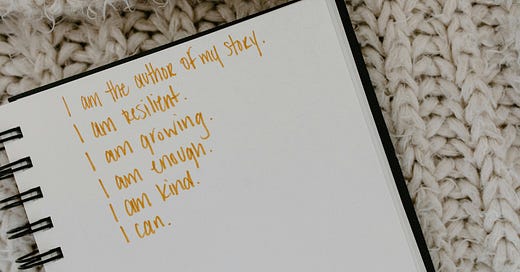Where does trauma exist within your relationship with yourself, and how can you begin to heal this?
This is the question we’re exploring in this week’s episode with our special guest host who writes ROAR Healing Relationship Trauma. Ellen will share what it looks like to understand and heal trauma within our relationships with Self, then she’ll lead us through a meditation and some journal prompts.
Ellen also kindly created some much more in-depth journaling exercises that we couldn’t fit into just one episode of the podcast, so you will find these exercises below for you to do independently. I’m providing you with a music track to play while you do these, so you can continue making the journaling process meditative, even beyond the container of this episode!
I hope you gain valuable insights from this episode, and please do feel free to share your impressions and insights with us in the comments for this post.
About Ellen
Ellen is a trauma therapist who helps folks heal trauma in their relationships with self, others, and the collective. Her work explores healing at the intersections of mental health, spirituality, and creativity. Ellen is currently slightly obsessed with renovating her 100 year old row home, one room at a time, and thanks her partner and cat for their patience with the endeavor.
You can learn more about Ellen via her Substack newsletter, ROAR Healing Relationship Trauma:
Hi there! I’m Ellen. I’m a trauma therapist, and I’ve been a journaler since I was about 10 years old. Around then, a teacher assigned regular journaling assignments and I’ve been hooked ever since. I’ve journaled off and on throughout my life, mostly in moments of emotional overwhelm, when it felt like there was no one who really got me. And in the past year, I’ve been journaling nearly every day after reading through The Artist’s Way with friends. Journaling has been a huge ally in my healing. It’s helped me realize my patterns, areas where I’m getting stuck in the same unhelpful beliefs about myself, and ways that I’ve grown.
Today, we’ll explore journaling as a way to heal trauma in the relationship you have with yourself. You might be asking, “Do I have trauma in my relationship with myself? How do I know?”
Where Trauma in Your Relationship with Yourself Comes From
Potential trauma happens in any moment when your brain and body are too overwhelmed to properly process what is happening to you. All overwhelming experiences don’t have to become traumatizing, and they often do when you lack the internal or external resources to help you understand what happened, move through the accompanying emotions, and return to a sense of safety.
Trauma in your relationship with yourself often begins in childhood. Even if you had pretty good parents, chances are there were some moments where something happened that overwhelmed you. Maybe you got hurt and your caregivers didn’t respond with loving care. Maybe they shamed you for having normal, human child experiences. Maybe moments like these happened over and over again. Because kids’ brains aren’t fully formed and they don’t have enough life experience, you likely internalized these moments. Your take-away from these moments was something like:
I’m bad.
I’m not good enough.
I’m a burden.
I must not show any emotion or have any needs.
Over time these beliefs can be reinforced by peer groups and society, providing additional evidence to your developing brain that they must be true. Protective parts of you grow around your wounds, aiming to shield you from feeling the fear, shame, anger, and/or loneliness that was so overwhelming to you when you were younger.
What Trauma in Your Relationship with Yourself Looks Like
If you internalized an idea like, “I’m unlovable, no one likes me,” you might chronically overextend yourself in an attempt to be likeable. You learn to ignore your internal cues about what you actually want and instead people-please your way into one-sided relationships.
If you learned in childhood, “I’m not good enough,” you might strive for perfectionism and/or over achievement, always aiming toward the next goal and spiraling downward for the smallest mistakes or accidents. A harsh inner critic may keep you on track and berate you for your perceived failures.
If your belief is something like “I’m a burden,” you may feel like a burden even to yourself. You might turn away from anything remotely challenging, including difficult emotions, through checking out in various ways: constant distractions, substances, seeking temporary relief through shopping or sex.
You might feel overwhelmed with emotion often. Or you might try to stuff emotions down so deep that you’re very nearly numb. Or you might stuff everything down until it’s just too much and then you’re overwhelmed and spiraling.
I’ve never met anyone who has trauma in their relationship with themself who has just one of these patterns, and if they all resonate, that makes sense, too.
Healing Trauma In Your Relationship with Yourself
Healing can happen in so many different ways. And there are a few internal qualities that will help you.
Self-awareness. So many of these patterns involve avoiding, ignoring, or overriding our own intuition, wants, needs, and desires. So while increasing awareness of these can be difficult and at times, uncomfortable, it is essential for healing.
Non-judgemental Curiosity. Aim to approach your internal experience with gentle interest in what’s going on, without labeling anything “good” or “bad”, “right” or “wrong”. This removes some of the shame that often underlies our wounds.
Self-compassion. Offering yourself the same kindness and care you would offer a best friend or loved one. Our wounding happened in the absence of compassion, so offering it to ourselves after the fact becomes a healing balm.
I’m sharing some Journaling Exercises below to help you explore and practice these qualities. And Marcy will be a music track that you can play while you go through them if you’d like.
Your Journal Prompts:
What is your relationship with yourself like?
What are some of your deepest beliefs about yourself? (Even if they don’t feel true logically, they might feel true in your heart, belly, or in a part of you.)
Where do these beliefs come from?
What are some of your Inner Critic’s favorite lines?
Do you ever offer yourself compassion? How does it feel?
Extended Journaling Session
Below are more in-depth exercises that Ellen has provided for us to do independently, as we weren’t able to fit it all into one episode. A music track is also provided below so you can journal with it playing in the background.
Journaling Exercise #1: Self-awareness
Take a moment to pause and really check in with yourself. You might find it helpful to set a timer so you don’t rush through. Notice what’s going on in your heart space, in your belly. Ask yourself these questions:
What do I want right now?
What do I need right now?
What do I desire right now?
What is my intuition saying right now?
After each question, listen for the answer. If an answer comes quickly, sit with that for a while to make sure it’s true. Imagine the answer coming to you from deep within, maybe from all the way down in your toes. If nothing comes, just notice that you’re feeling empty, blank, uncertain. You might try to ask yourself: if I did know, what would it be?
It can take time to build trust with yourself after ignoring these questions for so long, so you may need to repeat this exercise a few times before you get answers. And a few more times after that to feel like you can trust the answers you’re getting.
Journaling Exercise #2: Non-judgemental Curiosity
Choose an object in your space. Take some time to really observe it. Notice the shape, color, texture, shadows, highlights. Write a few sentences describing the object objectively. If you notice subjective thoughts (I like this, I don’t like that, This is good, etc.), don’t include them in your description.
Next try this with an internal experience. Maybe there’s a sensation (pain, tension, etc.) in your body. Maybe there’s an emotion present. Try to notice where that sensation or emotion exists in your body. Notice the shape. Notice if it has a color, a texture, a weight, any qualities. Try to separate what you notice from how you feel about what you notice. Record your observations in two separate paragraphs. For example:
I notice a pulsing, muscle-twitch like sensation in my upper right chest. It’s red and black striped, light and jittery. It’s happening just at the inside of my shoulder.
I feel scared of the twitching and anxious about what it might mean. Is there a problem with my heart? I want to remember to mention it to my doctor at my next annual check up, which is coming up.
The goal here is to practice neutrally observing our internal experience and separating sensation from any meaning we’re making of the sensation. Sometimes the meaning we make about certain sensations is correct, but sometimes, it’s not. Being able to accurately describe sensation and emotion without judgement allows us to learn what we need to from it and move on.
Journaling Exercise #3: Self-compassion
Imagine you’re your best friend or grandma. Someone who loves you deeply and has no trouble seeing all of the best things about you. Write yourself a letter from this heartspace. Tell yourself all the things you’ve been longing to hear. Tell yourself that everything you’ve felt makes sense given everything you’ve been through. Offer yourself the kind words of a loving friend, not the harsh mandates of an inner critic.
As you write this letter or shortly after, use your non-judgemental curiosity to notice what the experience is like for you. Is it easy, difficult? Do the words flow or do they feel stuck? Do they penetrate to your hurt places or do they get bounced off of some invisible barrier? Does it feel right in your head but wrong in your heart?
If this is very, very difficult, that’s okay! There is probably a reason why self-compassion is so hard for you. It’s hard for a lot of us! This is another skill to practice over time. You’ll get better with practice.
Journaling Practice: Regular Review
As I mentioned before, journaling has helped me notice and validate patterns over time. If this is work you’re also trying to do, you might find value in regularly reviewing your journals. It can take some trial and error to find the frequency that works best for you, but I recommend starting with weekly and monthly reviews. Here’s how that works:
At the end of the week, look back at all of the journal entries you’ve written. Search for common themes, repeated phrases, similar sentiments and make note of them. Some folks find highlighting or underlining with a different color pen helps here. You might also note words or passages that seem different or stand out in some way.
At the end of the month, look at your weekly summaries, and do the same. Note the key themes of the month. Notice how you talked about yourself and any habits or patterns that you recorded.
Ask yourself: What do I want to take with me into the next month? What do I want to leave behind? What is one small change I could try out this month?
You could also tie these reflections to moon cycles, seasons, or when you’re trying to get clarity about a specific problem. Don’t be afraid to adapt this structure into one that fits you, your life, and your goals.
Thank you again so much to Ellen for being on the podcast and sharing her wisdom with us on one of the most important relationships we have—the one we have with ourselves.
After each episode of the podcast, I invite you to close out by tapping into the wisdom of your Soul, and asking the question:
Soul, what piece of wisdom from this session do you most need me to remember?
We’d love to know your thoughts and if you’d be interested in hearing more about how you can heal your relationships. We could continue this series with two more episodes from Ellen, one on Journaling for Healing Trauma in our Relationships with Others and one Journaling for Healing Trauma in Our Relationships with the Collective. Please let us know your interest via the poll below!
What thoughts, feelings, and stories did this episode bring up for you?
And if this episode really spoke to you, please share it with anyone else who could benefit from it.
With much love and gratitude,
Marcy





















Share this post